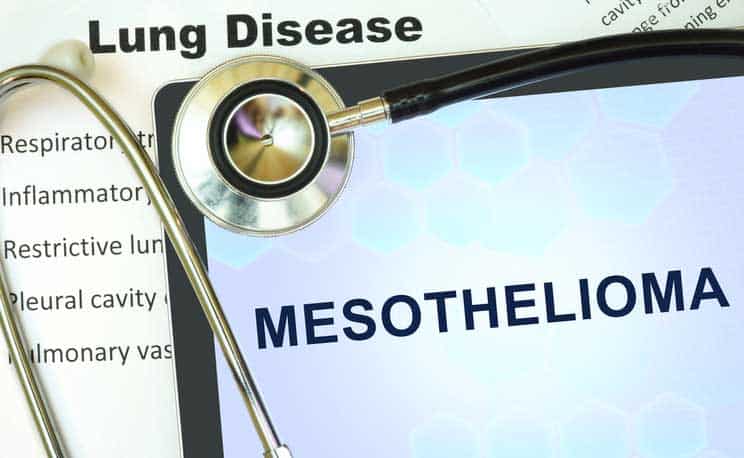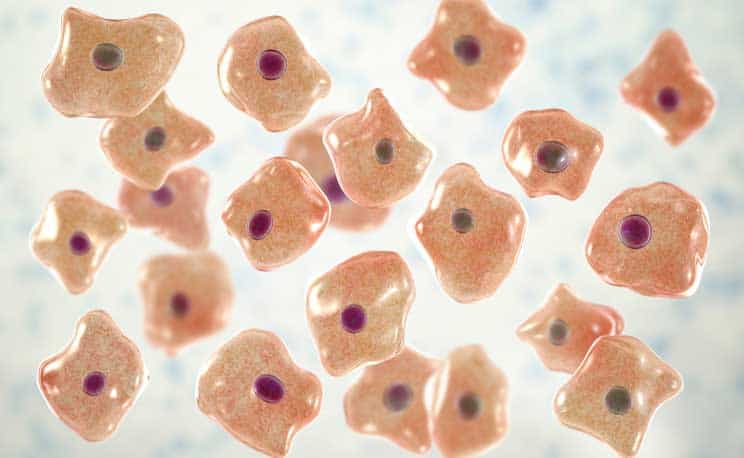What is Mesothelioma?
Mesothelioma Definition
Mesothelioma is an aggressive form of malignant cancer that arises in the mesothelium, a layer of tissue that surrounds certain internal organs. The different types of mesothelioma are often caused by exposure to asbestos. The mesothelium is a very thin membrane-like layer that covers the mediastinum, peritoneum, pleura, and peritoneum. Both the male and female reproductive organs are also surrounded by the mesothelium. The mesothelium develops in the embryo from the mesoderm cell layer, which lines the body cavity of the fetus. The job of the mesothelium is to provide protection to the internal organs.What Causes Mesothelioma?
Were you recently diagnosed with mesothelioma? If so, you have probably heard your mesothelioma doctor or oncologist mention asbestos exposure. Asbestos is a toxic naturally occurring silicate that was commonly used in insulation, heavy industry, shipbuilding, construction, mining, firefighting materials, and more, and is still used in very limited applications. If inhaled, the small asbestos fibers imbed into the lungs and years later, cause different types of asbestos related diseases, including mesothelioma.
Mesothelioma can also be contracted by second-hand asbestos exposure. Oftentimes people working with asbestos unknowingly carried the asbestos fibers on their clothing or in their hair, bringing the substance into their homes and exposing their families to the toxic substance.
When a person inhales asbestos, the microscopic fibers lodge deep within the lining of the lungs. Over time, they work their way throughout the body’s mesothelium causing mesothelioma to develop. Although asbestos exposure is the number one cause of mesothelioma, exposure to radiation therapy of the chest might also cause the cancer.

Other Asbestos Diseases
In addition to the different types of mesothelioma, asbestos exposure can lead to other cancers and diseases.
- Laryngeal cancer
- Lung cancer
- Ovarian cancer
- Stomach cancer
- Colon cancer
- Pharyngeal cancer
- Pleural effusion
- Asbestosis
- Pleural thickening
- Hyaline pleural plaques
- Peritoneal effusion (ascites)
- Pericardial effusion
- Atelectasis
Mesothelioma Types
Mesothelioma is categorized into four distinct types. The distinctions between the various types of mesothelioma are based on the tumors’ location. Pleural mesothelioma arises in the lungs (pleural) lining. Other types include abdomen (peritoneal), testicles (testicular) and heart (pericardial).
How do Doctors Define Mesothelioma Types?
Physicians define mesothelioma types on what part of the mesothelium the cancer arises. Once a diagnosis is made, the doctor will assign a stage to the tumor based on the location and size.
Stage One: The tumor is confined to one area and has not spread. At this stage, surgery is very effective at removing the mass. The survival rate at this stage is one to 22.2 months.
Stage Two: The tumor has spread to very localized areas. In some cases, it might have moved into certain organs or locations. Surgery can still be performed at this stage. Life expectancy hovers at two to 20 months.
Stage Three: At this stage, surgery can still be performed in some cases. However, the cancer has spread into the local lymph nodes and metastasis to surrounding areas is a very real possibility. Survival hovers at three to 17.9 months.
Stage Four: The cancer has spread to other organs in the body. Life expectancy drops to four to 14.9 months. Chemotherapy and immunotherapy are often used to slow the cancer’s growth and spread while relieving symptoms.
Types of Mesothelioma by Location of Tumor
There are four types of mesothelioma that are categorized by the location of the tumor. With all four types, the first treatment option pursued is usually surgery to remove the tumor. However, if the cancer has spread then other treatments, such as chemotherapy or immunotherapy, might be used to slow the tumor’s growth and spread while easing the patient’s symptoms. With treatment, the goal is always to extend life while making the patient as comfortable as possible so that they can have an improved quality of life.
With all four types of mesothelioma, asbestos is the main cause.
Pleural Mesothelioma (Lungs)
Pleural mesothelioma accounts for 80 to 90 percent of all mesothelioma types. It arises in the pleura lining that surrounds the lungs. Upon diagnosis, most patients survive six to 12 months. The one-year survival rate hovers at around 73 percent and the five-year survival rate dips to 12 percent.
Peritoneal Mesothelioma (Abdomen)
Peritoneal mesothelioma is categorized as the second most common form of cancer (15 to 20 percent of mesothelioma cases). The form of cancer arises in the abdominal cavity (peritoneum lining). This type of mesothelioma has the most favorable survival rate with 92 percent of all patients still alive one year after diagnosis. The medical advances that have been used to treat this form of cancer are groundbreaking. Surgery in combination with hyperthermic intraperitoneal chemotherapy (HIPEC) offers the greatest hope of survival with as many as 50 percent still surviving after five years.
Pericardial Mesothelioma (Heart)
Pericardial mesothelioma is extremely rare. The cancer type arises in the pericardium lining that surrounds the heart. Every year, less than 50 cases are diagnosed in the U.S.A. This type is only one percent of all mesothelioma cases. About 51 percent of all who are diagnosed with this cancer survive the first year.
Testicular Mesothelioma (Testes)
Less than one percent of all mesothelioma cases are testicular. The cancerous tumor starts out in the tunica vaginalis of the testicles. Typical survival with this type of mesothelioma is two years.
Types of Mesothelioma Cancer by Cell
Mesothelioma cancer is divided into three cell variations: epithelioid, sarcomatoid, and biphasic. The variations are further broken down into subtypes. Cancer cell types are big determining factors for a patient’s prognosis and the layout of an effective treatment plan. The cellular variations that are noted in mesothelioma are due to genetic mutations that occur within the patients’ healthy cells when they are exposed to asbestos.
Epithelial Cell Mesothelioma
Approximately 50 to 70 percent of all mesothelioma cancers are epithelial cell mesothelioma. It is by far the most common cell type. The prognosis of such patients is also considerably better. Epithelial cells do not react well to asbestos exposure and can quickly start to mutate into a tumor.
The appearance of epithelioid cells is elongated and predominantly egg-shaped. The nuclei are very visible which is one of the defining hallmarks of this cell type. The cells look like that of the malignancy’s adenocarcinoma and breast cancer. Unlike other asbestos cancer cell types, epithelioid cells divide at a rapid rate, which is why this form of cancer grows so quickly. On a positive note, the cells stick together so metastasis is not fast occurring.

- Chest pain
- Stomach distention
- Shortness of breath
- Pleural effusions
- Abdominal pain
- Ascites (a buildup of fluid within the abdomen)
A biopsy confirms the cell type. It is common for a physician to ask if a patient has had exposure to asbestos insulation during the examination. Immunohistochemistry is used to further confirm the diagnosis.
Immunohistochemistry looks for certain proteins that are cancer markers and appear in the cellular makeup of the malignancy.
- D2-40
- CK5/6
- Wilms’ tumor-I antigen
- Calretinin
Treatments for epithelioid mesothelioma tend to be the same as all other cell types. However, treatment does appear more effective. Depending on the patient, extrapleural pneumonectomy (EPP) has been shown to increase life expectancy. Pleurectomy with decortication (P/D) is often used if there is no metastasis past the lungs. Cytoreductive surgery is another option for those with epithelioid peritoneal mesothelioma. In addition, chemotherapy and radiation continue to be used on many epithelioid cell types.
Sarcomatoid Cell Mesothelioma
Sarcomatoid cell mesothelioma has the shortest life expectancy because it does not respond well to treatment. In addition, the cell type metastasizes quickly. Those diagnosed with pleural sarcomatoid mesothelioma face an average life expectancy of eight months. About 10 to 20 percent of pleural mesothelioma and four percent of peritoneal cases diagnosed are sarcomatoid cell type.
The sarcomatoid cells appear as spindle shapes that have a very elongated and large nuclei. In some cases, the cells have more than one nucleus which makes them difficult to distinguish between healthy cells. This form of asbestos cancer cell type does not grow in a regular pattern but instead spreads through the soft tissue which makes it very hard to locate the cancer cells to remove them.

Diagnosis and staging of this form are very hard because of the difficulty in identifying and discerning the concentration of malignant cells following a biopsy. Sometimes the test is simply inconclusive, so immunohistochemistry is used to determine the cell type.
- D2-40
- Podoplanin
- Pancytokeratin
- Calretinin
Surgery and chemotherapy for sarcomatoid mesothelioma tend to be ineffective. Clinical trials that are studying virotherapy or immunotherapy are an option of treatment.
- Transitional mesothelioma
- Lymphohistiocytoid mesothelioma
- Desmoplastic mesothelioma
Biphasic Mesothelioma
Biphasic cell type is a combination of epithelioid along with sarcomatoid cells. If the tumor is predominantly epithelioid cells, then they tend to grow quickly but do not spread as aggressively. Tumors with higher sarcomatoid cells metastasize quickly. Life expectancy is hard to determine because it depends on the ratio of the two cell types.
With biphasic cell type, both cells exist in the same tumor. The rate of this cell type is about 30 percent for all pleural mesothelioma and 25 percent for peritoneal tumors.
Various sections of the tumor undergo biopsy to determine if the tumor is biphasic. Immunohistochemistry is typically used for additional information. About 26 percent of mesothelium cell types are biphasic.
Surgery, radiation, and chemotherapy are typically used to treat the cell type.
Finding Mesothelioma Help
Many people who are first diagnosed with mesothelioma aren’t necessarily aware of the connection it has with asbestos. Most companies dealing with asbestos, however, have known since the 1930s that the substance was harmful to humans. Decades would pass before asbestos testing and restrictive laws were implemented. In addition to seeking the care of the best mesothelioma doctors and medical care providers, a skilled mesothelioma lawyer can offer legal help in holding those companies accountable for their negligence that led to your contracting mesothelioma.
Were you Diagnosed with one of these Types of Mesothelioma?
If you were recently diagnosed with one of these types of mesothelioma then you might find yourself scrambling to understand the cell types, learn your prognosis, and explore possible treatment options. The amount of information available might feel overwhelming. Finding the best mesothelioma doctor in addition to a team of skilled mesothelioma attorneys to help you navigate the disease can help put your mind at ease.
Finding Mesothelioma Doctors
As mentioned, you’ll want a skilled and knowledgeable mesothelioma doctor and oncologist. It can take a team to achieve leading care. Medicine is ever evolving, and new treatments are constantly researched in clinical trials. You’ll want a physician who is aware of the medical innovations and the various treatments that might help extend your life.
Finding a Mesothelioma Attorney
If you were diagnosed with mesothelioma then you are probably facing mounting medical costs. Your family might even be in danger of being forced to file bankruptcy. Perhaps there is no money for crucial treatments. Whatever the case, with legal assistance, you can gain compensation from the companies who have manufactured and had their employees work with the toxic asbestos substance. Even if your time is limited due to the nature of your carcinoma, you might still want to start a legal battle so you can leave something behind for your loved ones. Get legal help now or call 833-716-0087
The Law Center’s top priority is matching our clients with some of the most highly experienced mesothelioma attorneys in the country. Our partner, Environmental Litigation Group has over 25 years of experience specializing in asbestos exposure cases. You and your family deserve trustworthy and highly competent legal counsel in pursuing justice for an asbestos-related injury.
Sources
- https://www.webmd.com/cancer/types-of-mesothelioma
- https://www.mayoclinic.org/diseases-conditions/mesothelioma/symptoms-causes/syc-20375022
- https://www.pennmedicine.org/cancer/types-of-cancer/mesothelioma/types-of-mesothelioma
- https://hillman.upmc.com/cancer-care/lung/types/mesothelioma
- https://www.ncbi.nlm.nih.gov/pmc/articles/PMC2698271/
- https://www.cancerresearchuk.org/about-cancer/mesothelioma
- https://www.cancer.org/cancer/malignant-mesothelioma/about/malignant-mesothelioma.html
- https://medlineplus.gov/mesothelioma.html